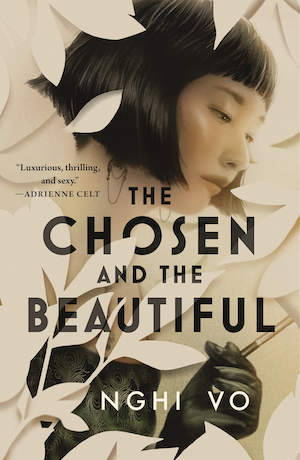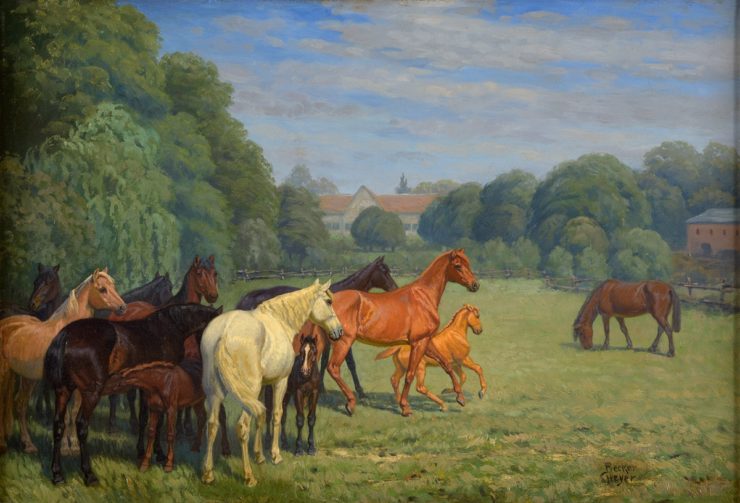A frequent subject of my Morning Manure Meditations—the hour of the morning when I feed horses and clean stalls and finish waking up because Not A Morning Person Here—is the way horses live so completely in this physical world. I’ve written about it before, but it keeps showing me new faces of itself, or illuminating older ones.
Horses are so inescapably there. They’re big compared to us humans. They take up a lot of room. Their scale is so much larger than ours, and so is their presence when we’re near them.
They aren’t as noisy as you might expect. On hard ground you can hear the clop of hooves as they walk, and when they run, especially en masse, the thunder shakes the sky as much as the earth. But on grass or bare ground, when they’re going about their daily business, they’re almost soundless. They can sneak up behind you before you even notice, especially if you’re all up in your head the way humans tend to get.
They don’t vocalize much at all, no matter what Hollywood may make you think. Snorts and snuffles mainly, and the quiet sound of chewing as they graze, with an occasional swish of tail or stamp of foot at flies. If a horse whinnies, it’s usually a distress call, and occasionally a stallion declaring his presence to his rivals.
And yet when you let yourself be with them, either in a safe and familiar herd or outside a pasture fence or even in a barn where horses are settled in to their boxes, it sinks in on you that horses are deeply aware of their position in space. They live in all dimensions; when you ride them or walk beside or among them, it can feel as if they’re swimming in air the way a dolphin swims in water. They’re aware of everything around them: ears flicking, skin twitching, their whole body in communication with the world.
If something catches their attention, their head will come up and their ears and eyes will focus. For the most part, the higher the head, the farther away the target of interest. If it’s just interest, their body language will be alert but relaxed, watchful in case it turns out to be a threat, but mostly just looking to see what it is. If there’s reason for alarm, they’ll tense up, and they’ll snort to alert the others, then wheel and bolt away.
Different horses have different levels of energy. Some can deliver the effect of an electric shock when they react to something anomalous in the environment; it snaps through you, and you may find yourself shying as hard as the horse. Which is useful if you’re a horse in the herd, but a problem if you’re a human riding or driving or leading the horse: you have to learn to suppress the shock and maintain a facade of calm, to keep things from escalating out of control.
Buy the Book


The Chosen and the Beautiful
Learning to develop that calm, to be less reactive and more proactive, is essential for anyone who wants or needs to be around horses. Horses are so reactive, so innately on edge, because they’re prey animals and because, living in herds, they have to be hyperaware of each other as well as anything that might be threatening them from outside. And yet they can radiate such calm, be so soothing as they nap and graze and bask in the sun. A horse in distress is both distressing to be near and outright dangerous to try to handle, but a horse at peace can bring immeasurable comfort to a distressed human.
The other day I had the vet in for a checkup on my eldest mare. This mare is a bit of a bulldozer, and her field of fucks went barren a long time ago. She’s had a slew of babies, she’s terrorized not a few barn managers, and she’s here because she doesn’t want to be anywhere else. She can give you serious blowback if you try to Do Things to her, such as worm her or give her an injection.
And yet for this vet, who has previously performed surgery on her so there’s been some trauma there (and horses remember; their memories are long), she was as soft and sweet and kind as a horse can possibly be. She was mothering her even though a physical exam and a blood draw. And then she stood close for a long few moments, just breathing.
The vet had been hours late because of an emergency. The patient had not made it. My mare knew. She gave her gift of calm and her large warm comfort. There was a tear or two, and a heartfelt thank you, before the vet went on about her rounds.
It was a reminder for me as well as a comfort for the vet. So much of horse care is grinding routine. Every day, multiple times a day, in all weathers, I have to be out there, feeding and caring for them. There’s no break, no vacation, no skipping meals or sleeping in.
Sometimes I have to just stop and breathe, and let myself be in their world. I get to see Mercury beside the moon and snow on cacti and clouds shaped like dragons and ravens conversing with horses and hawks circling each other directly above me and the full moon rising over a horse’s back. I see the lightning dancing while the thunder walks, I watch rabbits play leapfrog, I see a gila monster book it across the paddock. I’m in the world and out of my head, and as much as a human can, I’m seeing and feeling it the way a horse will. There’s nothing else like it.
Judith Tarr’s first novel, The Isle of Glass, appeared in 1985. Since then she’s written novels and shorter works of historical fiction and historical fantasy and epic fantasy and space opera and contemporary fantasy, many of which have been reborn as ebooks. She has written a primer for writers: Writing Horses: The Fine Art of Getting It Right. She has won the Crawford Award, and been a finalist for the World Fantasy Award and the Locus Award. She lives in Arizona with an assortment of cats, a blue-eyed dog, and a herd of Lipizzan horses.











This was beautiful. Yup.
On our way to the class today, my mare for the day kept looking right and at some point neighed loud. They’re usually not that loudly opinionated when we go to the class or come from there, so it made me wonder. On our way back, we noticed the part of the herd not used for the classes from the other stable a bit farther behind the trees and a few buildings, let out to the overnight pasture. It was instantly crystal clear what had caught her interest previously and it was me, silly human, who just failed to see the others before (or maybe because they were farther and out of our visual zone, but she knew they were there).
I do not often think on a lot of these things consciously, but I could not agree more with what was said in the article. They know. They are. You can only hope to snap out of your too-human mindset sometimes for a bit and try to see the world with a bit more open eyes and mind. Like they might.
Thanks for this.
I felt the same when I trained dogs for trailing- the world is so much bigger than what I can sense.
Today is a grey day, both in reality and energy. I’m tired (not enough sleep last night) and cranky (unable to make words on my screen live up to what I see in my head… grr.) But for a few glorious minutes, I could _smell_ the dust and sweat of horses. That earthy, rich, grounding scent that says, “I’m here, nothing else is important now.” It’s been more than 20 years, but I still remember that smell. I remember the way each of my senses would relax and then somehow, I don’t know, crystalize – as though a door had been opened, and I could see and feel _more_ than only a few seconds before. Thank you for reminding me today.
This was beautiful. Thank you.
Yes! This is spot on. I see myself and my rescue mare in this <3
I was a teenager when my family bought an appaloosa cowpony. He’s the only horse I got to know well. During the purchase a ranch hand told us, “Make sure there is plenty of head room above his manger. If he’s eating and anything happens—just someone walking into the barn will do it—he’ll lift his head. Every time. If there is a beam in the way, he’ll bang his head on it. Every time. He’ll never learn. Before long you’ll have a horse who is bat-shit crazy.”